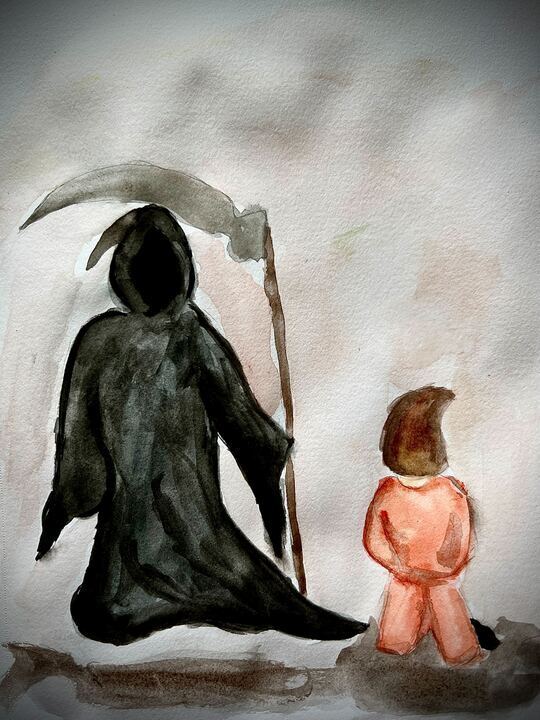End the death penalty now
Cartoonist Ana Guzman illustrates death standing next to a prisoner with their head covered awaiting the death penalty. Columnist Emily Beebe informs readers of the cruelty of the death penalty and urges the punishment to be abolished nationwide.
May 3, 2023
The death penalty is an outdated, barbaric practice that has no place in modern society. It’s time to end this cruel and unjust punishment once and for all.
For years, the death penalty has been a contentious issue in the United States. According to the Death Penalty Information Center, the death penalty has been controversial since the 1960s, due to it being deemed a cruel and unusual punishment.
According to NBC News, 24 states still have the death penalty. Three states – California, Oregon and Pennsylvania – are in the moratorium phase, meaning they have temporarily prohibited the death penalty. Overall 27 states – the 24 plus the three in moratorium – have the death penalty. The fact more than half of the 50 states have the death penalty is extremely concerning.
In the U.S, the states that do have the death penalty require a unanimous jury (with the exception of Alabama) to recommend or sentence someone to death, according to the Death Penalty Information center.
Due to the verdict from the case Hurst v. Florida, which has gone back and forth since 2016, in the past Florida did require a unanimous jury to recommend someone to death. However, in 2017 the rule of having a unanimous verdict was reinstated.
However, Florida Gov. Ron DeSantis just signed a bill called SB 450, which eliminates unanimous jury decisions and lowers the number of jurors needed from 12 to eight, according to Florida Rules. By signing this bill, DeSantis wants to repeal the unanimous jury verdict that was initiated in Hurst v. Florida.
Although this bill is somewhat making progress of the death penalty by lowering the number of jurors and by potentially having fewer cases where the death penalty would be used, in all honesty, Florida should just abolish the death penalty overall. According to Psychology Today, some people who have mental health challenges do commit crimes and they do not deserve to lose their lives over what could be considered an accident.
Marc Falkoff, professor of law and director of NIU’s prisoner’s rights project, said that there are many racial disparities when it comes to the death penalty.
“I am adamantly opposed to our having a death penalty because I believe it is impossible to administer in a non-discriminatory manner,” Falkoff said.
The death penalty is not a crime deterrent. The American Civil Liberties Union explained that the states that have abolished the death penalty have not seen an increase in homicide rates compared to those that still use it. In fact, Death Penalty Information Center, a national non-profit organization dedicated to serving the public with information concerning capital punishment, even suggests that the death penalty may increase murder rates by perpetuating a culture of violence and revenge.
Furthermore, the death penalty is not necessary for justice. Life imprisonment without the possibility of parole can accomplish the same goals of death penalty laws by providing punishment for heinous crimes while also protecting society from dangerous individuals.
In addition, there have been numerous cases of innocent people such as Ruben Cantu, Larry Griffin and Cameron Todd Willingham being put to death due to faulty evidence, coerced confessions or inadequate legal representation, according to Avvo, a website that provides legal resources.
Victims’ families also do not receive closure from the death penalty. According to the Death Penalty Information center, many families of victims such as Mark Heyer, have spoken out against the death penalty, saying that it only perpetuates the cycle of violence and does nothing to heal the pain of losing a loved one. Instead, the focus should be on providing support and resources for victims’ families, such as counseling and financial assistance.
Mark Heyer’s daughter was murdered, but he didn’t want her murderer to receive the death penalty. He would rather have had her murderer have life in prison, according to the Death Penalty Information Center. It is truly powerful that a man whose own daughter was killed does not want the same punishment for her killer.
It’s time for us as a society to join the rest of the world in recognizing that every life is valuable and deserving of respect.







